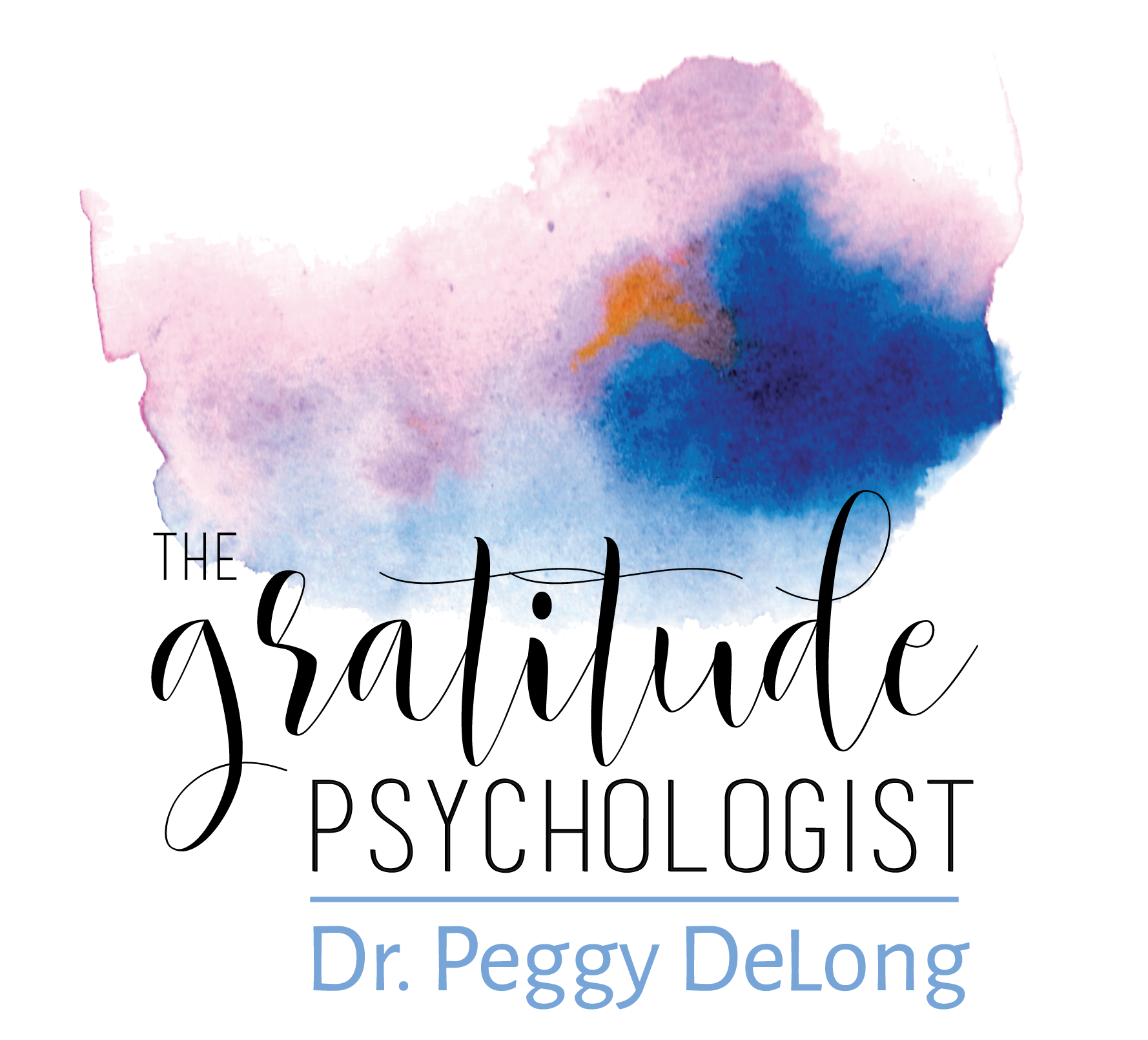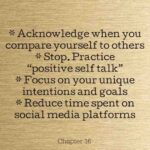
Do Not Compare Yourself to Others
Chapter 16: Do Not Compare Yourself to Others
“Comparison is the thief of joy.” –Theodore Roosevelt
Comparing yourself to others is the quickest way to zap your happiness. You may be very happy with your belongings, achievements, and successes; yet, as soon as you compare yourself unfavorably to someone, your joy disappears. In an instant. Just like that. Gone.
I learned about social comparison in my child development class during the first semester of my doctoral program. In fact, social comparison is actually part of normal development. Social comparison theory, proposed by Leon Festinger, states that comparing ourselves to others is a way of evaluating ourselves and gaining information about our own skills, attitudes, and beliefs.[i] According to Festinger, there are two kinds of social comparison. Upward social comparison is when we compare ourselves to others we perceive as being better than us in some way. This may motivate us to improve to be more like them. However, it may also cause us to feel bad about ourselves. Downward social comparison happens when we compare ourselves to others we perceive to be worse off in some way.
Upward social comparison doesn’t have to be a bad thing. In some cases, it may actually be helpful. Noticing the skills and abilities of other people can provide us with feedback about ourselves and motivate us to improve. The problem is when we get stuck and let upward social comparison affect our self-worth, or worse, let it dash our dreams.
I often got stuck in upward social comparison when I was young, but it was hard not to. I grew up in a very affluent town, so I had quite a warped sense of what was normal. My family lived comfortably. I know my parents struggled before I was born when my father first started his medical practice, as I often heard the story of how he only had one nice shirt that my mother washed and ironed every day. If we had any financial struggles, I didn’t know it. But I often felt like everyone had more. Way more. I grew up with friends who had not just boats, but yachts and second homes at the beach larger than my house. Kids drove BMWs, Ferraris, and Porsches to school while my father drove a Chevy Citation. The floor was so rusted out that there was actually a hole in it, and I could see the road whizzing by under my feet!
There’s nothing wrong with having money. The problem was that when I compared my life to those I perceived had more, it made me feel like a “have not.” Boy was I wrong. This is probably one of my biggest regrets, not appreciating what I had because I compared myself to others. I allowed social comparison to eradicate gratitude for what I had and make me feel “less than.”
It didn’t stop there. Kids at my high school were smart, damn smart! Bernards High School was not only one of the best high schools in the state of New Jersey; it was one of the best in the country. It was common for graduating students to head off to Harvard, Princeton, University of Pennsylvania, and Stanford. I happened to be friends with some of the smartest kids. Even though I graduated eleventh in my class, I felt less accomplished when I compared myself to two friends who made the top ten. I let comparison steal the joy of my amazing accomplishment. What would have been better for me? Simply focus on my own success, be proud of what I had achieved, and have faith in knowing that I had a bright future. Unfortunately, this comparison pattern only intensified when I became a mother. I never considered myself to be an insecure person but comparing myself to other new mothers was a guaranteed way to make me feel “less than.” New mothers often don’t talk about how difficult it is.
I’m grateful that I didn’t have post-partum depression, but my brain was fried. The thirty-six hours of labor followed by sleepless nights caring for a newborn resulted in me living in a fuzzy cognitive fog. I had difficulty breastfeeding, and I thought it was easy for everyone else. I couldn’t follow the simple directions on how to use a bottle sterilizer, and I compared myself to other mothers who seemed to have it all together. My sweet firstborn needed to be held every minute, or else she would cry. This meant I often could not shower for three days straight. When I did try to take a shower, my daughter would start screaming after I put her in the bouncy seat right next to the shower stall. More than once I had to jump out of the shower with shampoo or conditioner still in my hair in order to console her. So I simply stopped showering daily! Thank goodness, social media did not exist when I became a mother! I may have compared myself to the mother who not only was able to shower, but was able to put on her makeup, do her hair, and post beautiful selfies!
Since I know that social comparison is a normal part of development, and often continues into adulthood even when we have a pretty good sense of identity, I always assess my clients’ use of social comparison. Additionally, I assess their use of social media, because it can be a feeding ground for unhealthy upward social comparison. People tend to post their “highlight reels” consisting of vacations and accomplishments, as well as physical attractiveness through “selfies” that are not even real because they have been altered by the latest beauty-enhancing app that whitens teeth, removes wrinkles, and narrows faces.
A recent study found that passive Facebook use significantly lowered self-esteem and increased depression for individuals who have a tendency to compare themselves to others.[ii] Other than the chronic complainers who feel compelled to write about every time they received poor services at a restaurant or were cut off on the highway, most people only post the wonderful things going on in their lives, such as a recent vacation or the birth of a grandchild. This is not to say that their good stuff is not real or not worthy of announcing for celebration. But when we only see their “highlight reels” and not the reality of others’ lives (including the bad stuff), we do not get the full picture. Then we begin to feel bad about ourselves because of our daily struggles. Since I cannot go back in time and change my overuse of upward social comparison and its negative impact of making me feel “less than,” I want to do my damnedest not to ignore others who do the same. I find myself saying repeatedly, “Comparison is the thief of joy.”
Now that I’m older and wiser, I am quicker at recognizing when I am comparing myself to others, and I am better at shifting my thinking to all that is going well in my life. Along the way I realized that I usually compared myself to a perception, a made-up story, a standard that did not even exist, instead of reality. These insights only came with experience. The couple that seemed to have it all together got divorced. The woman who I thought looked down on me lost her beautiful house in foreclosure. Of course, I did not celebrate other people’s crises, but they opened my eyes that so much goes on behind closed doors that I don’t know about. There’s a good reason why that is true: it’s none of my business.
Fortunately, I now know that I have the power to control my thoughts. If I realize that I am comparing myself to others, I can shift my thinking. You can too! Freedom of thought is one of our greatest human freedoms. It’s not easy to steer away from negative thinking, but with practice, it’s possible. Anything we want to improve upon requires practice, which involves focused attention and repetition. For example, I could feel bad because a friend just purchased a new BMW while I’m driving a Honda Pilot with 210,000 miles on it. However, instead of engaging in that social comparison, I can choose to focus on memories of all the adventures that I’ve experienced in those 210,000 miles. With that simple shift, I can change my feeling in the moment. That is freedom.
Take Action
- When you catch yourself comparing yourself to others, simply acknowledge what you are doing. Noticing and acknowledging your behavior is the first step. You may be doing this all day long and not be aware of it. So pay attention to your thoughts, behavior, and feelings. Ask yourself if you’re engaging in upward social comparison. Are you getting stuck there? Are you using any information gleaned to better yourself, or are you allowing comparison to make yourself feel “less than?” If you find the latter, tell yourself to stop, and think about one thing you are proud of. It may sound simplistic, but it works. Use the little cognitive strategy called “positive self-talk.”
- Instead of comparing yourself to others, focus on yourself and your own goals. If you are reading this book, you’re probably old enough to have a good sense of who you are and not need to rely on social comparison to evaluate yourself. Instead of using social comparison to beat yourself up, simply outline your own intentions and goals with your timeline, based solely on your life. Regardless of what is going on with everyone else in the world, what can you do to be your best self?
- Remember that the use of social media exacerbates the negative impact of upward social comparison. Pay attention to how you feel after being on social media and limit your usage if you notice that you feel worse. Most people feel better when they reduce the time they spend on these platforms.
[i] Leon Festinger, “A theory of social comparison processes,” Human Relations 7, no. 2 (1954): 117-140.
[ii] Phillip Ozimek and Hans-Werner Bierhoff, “All My Online-Friends are Better Than Me – Three Studies About Ability-Based Comparative Social Media Use, Self-Esteem, and Depressive Tendencies,” Behaviour and Information Technology, 2019.



Leave a Reply